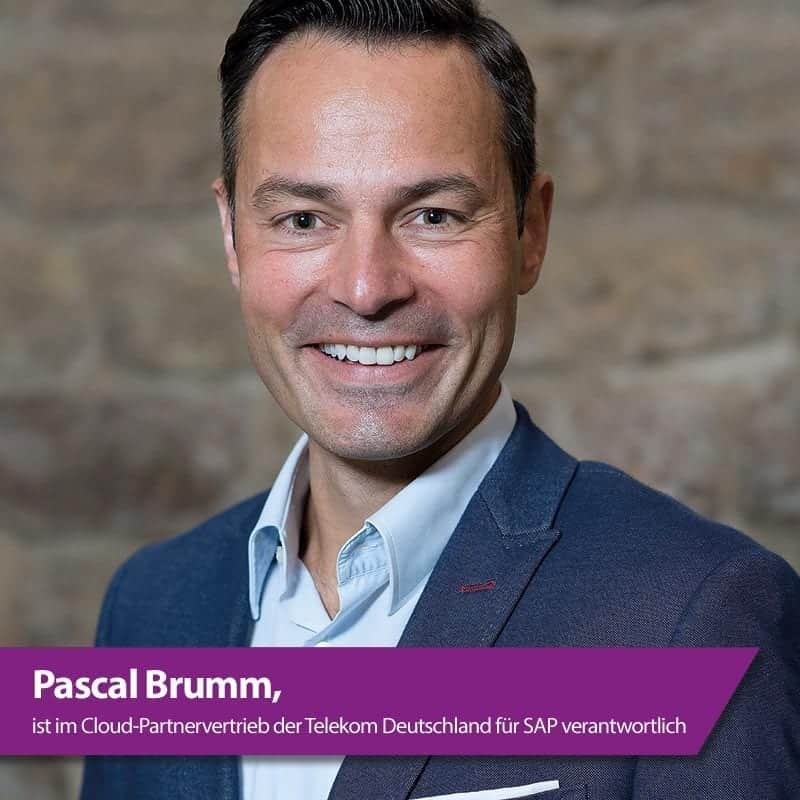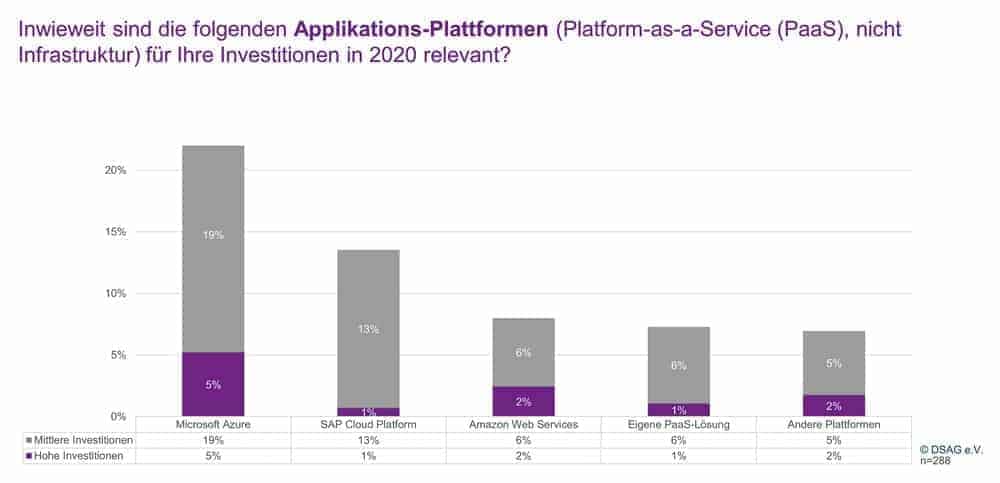The all-rounder - SAP operation in the cloud
![[shutterstock.com: 494860990, Orla]](https://e3mag.com/wp-content/uploads/2020/02/shutterstock_494860990.jpg)

More and more SMEs in Germany are driving digital transformation and using technologies such as big data, artificial intelligence and cloud computing. The software tools required for this are supplied by software manufacturer SAP.
IT service providers such as Telekom offer the Walldorf-based company's complete product range for companies of all sizes and from all sectors. First and foremost the ERP systems S/4, Business by Design and Business One. In addition, the Business Suite offers numerous solutions for specific business tasks. SAP C/4, for example, for customer relationship management including e-commerce, SuccessFactors for human resources or Concur for travel expense management.
SAP's own Hana database can also be used to manage all business data in real time. It forms the basis for intelligent analyses and forecasts that help SMEs to advance innovative or even disruptive business models in times of digital change.
Many SAP customers are spending more on their IT in order to master the challenges of digitalization. This is the conclusion of the 2020 Investment Report published in January by the German-speaking SAP User Group (DSAG).

According to the survey, 46% of the companies surveyed in Germany, Austria and Switzerland are increasing their general IT budget. At 35 percent, expenditure remains constant, while 19 percent are reducing it.
When it comes to SAP investments in particular, the picture is similar: 49 percent of respondents want to invest more, 19 percent want to invest less and 32 percent want to keep spending constant.
According to the DSAG report, SAP customers are increasingly investing in S/4 Hana: ten percent of companies are already using the software, nine percent are making the switch this year and 40 percent of those surveyed intend to do so within the next three years.
On-premises, private or public cloud?
Whether S/4 Hana or Business One, on-premises or in the cloud: for many medium-sized companies, setting up and operating their SAP landscapes is a challenge because it is almost impossible to find suitable specialists for vacant IT positions in Germany.
According to the Federal Statistical Office (Destatis), one in ten companies with ten or more employees hired or attempted to hire IT specialists in 2018. More than two thirds of these (69%) reported difficulties in doing so.
In order to be able to implement digitalization projects, specialist service providers provide support with expertise and specialists. We deliver end-to-end services across all phases.
Starting with analysis and consulting, we provide a roadmap and a business case as the project progresses. After implementation, we operate the SAP system and take care of maintenance and support.
While large companies and corporations can afford multi-provider management, SMEs need a reliable partner who understands IT and can provide all the necessary resources. This is where Telekom comes into play.
We take over operations on-premises or relieve the burden on SMEs with flexible deployment models such as private or public clouds. When it comes to cloud infrastructures, we provide flexible storage and server capacities that SAP customers can use to cushion new requirements or further growth.
Furthermore, a cloud migration gives customers the opportunity to rethink their processes. In addition to the pure lift & shift, i.e. the migration of applications and data to the cloud platform, they can put internal processes to the test and standardize them. This resolves innovation backlogs and makes companies more competitive.

Partner ecosystem for SAP matters
IT service providers rely on partner ecosystems to map the entire SAP portfolio for customers on-premises and in a private or public cloud (see also the interview with Michael Müller-Berg, page 49).
When it comes to SAP, Telekom works together with 30 partners. The network includes the subsidiaries T-Systems, T-Systems Multimedia Solutions and Detecon.
In addition, there are other companies that focus on niche topics or are particularly proficient in individual SAP products - for example SAP C/4 Hana, SuccessFactors or Business One, the smallest of SAP's ERP solutions. Or there are partners who focus primarily on industry-specific SME requirements.
Public cloud services
The public cloud in particular offers SAP customers new opportunities: Medium-sized companies receive quickly scalable infrastructures if required, and pay-per-use enables resource-based billing.
The costs for operation thus remain transparent and calculable for the future. This means that SMEs do not have to invest in hardware or software, but only pay for the cloud services that they actually use.
As public cloud services are offered from professional data centers, they meet high standards in terms of high availability and cyber security.
The service providers provide maintenance and support for the systems used and ensure that they are always up to date with the latest technology.
In practice, we often see customers taking a step-by-step approach. First, the test system is moved to a public cloud and then the production system is added later.
As a result, more and more business-critical SAP applications are migrating to the cloud. A trend that was confirmed by a study published by analyst firm teknowlogy Group in mid-2019.
According to the report, SAP customers are currently exploring the opportunities that arise with the growing maturity of hyperscaler platforms such as Microsoft Azure.
According to the study, this trend is driven on the one hand by potential savings in operating costs. On the other hand, companies expect more automation and agility in SAP operations from the public cloud.
They appreciate the opportunity to set up globally standardized infrastructures more easily than before and to integrate data validly and distribute it in a targeted manner throughout the entire organization.
What might the costs for public cloud services look like? We offer packages specially designed for Microsoft Azure in sizes S, M and L with application availability of up to 99.7%.
The cheapest basic package for SAP operations in the Azure cloud starts at 3300 euros per month. Size M is available from 5000 euros and package L for 7600 euros per month.

Proof of performance: Ready to take off
The SAP infrastructure of a German airport company has grown organically over many years. Due to the outdated system landscape, it was no longer able to react flexibly and quickly enough to current business requirements. In addition, operation and maintenance were time-consuming and cost-intensive. In order to benefit from a modern SAP infrastructure in the future, those responsible decided on a cloud solution. Together with Telekom subsidiary T-Systems, the airport company converted its previous IT systems into a lean, data-centric and cloud-based IT landscape. The service provider supported the project from the system analysis and definition of the optimal target landscape, through the transition to the cloud and S/4 Hana, to the operation of the standardized IT systems and applications in the cloud. The result: the new platform sets the course for the airport company's digital transformation, enabling it to react flexibly to new customer requirements.






